Solar Pool Heater Technology
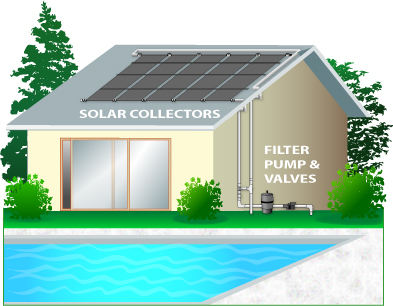
Solar Pool Heating is one of the simplest yet the most cost-effective use of solar energy in many climates. Water is pumped from the pool to the solar collectors where the water is warmed by the sun. The warm water is then pumped back into the swimming pool allowing you to enjoy your pool for many months, and in some areas all year long. Most solar pool heating systems include the following:
- A solar collector — the device through which pool water is circulated to be heated by the sun
- A filter — removes debris before water is pumped through the collector
- A pump — circulates water through the filter and collector and back to the pool
- A flow control valve — automatic or manual device that diverts pool water through the solar collector.
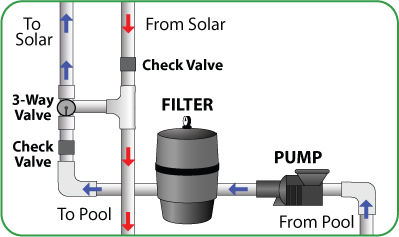
Some systems include sensors and an automatic or manual valve to divert water through the collector(s) when the collector temperature is sufficiently greater than the pool temperature. When the collector temperature is similar to the pool temperature, filtered water simply bypasses the collector(s) and is returned to the pool.
Solar Pool Heater System Types
Solar pool collectors are made out of different materials. The type you'll need depends on your climate and how you intend to use the collector. If you'll only be using your pool when temperatures are above freezing, then you'll probably only need an unglazed collector system.
Unglazed Solar Pool Heating Collectors
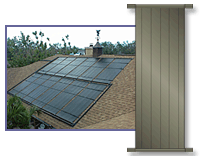 Because of their inexpensive parts and simple design, unglazed collectors are far less expensive than glazed collectors. Unglazed collectors don't include a glass covering (glazing). They are generally made of heavy-duty rubber or plastic treated with an ultraviolet (UV) light inhibitor to extend the life of the panels. These unglazed systems can even work for indoor pools in cold climates if the system is designed to drain back to the pool when not in use. Even if you have to shut the system down during cold weather, unglazed collectors are more cost effective than installing a more expensive glazed collector system. » Vortex Solar Pool Heater - Unglazed Collectors Because of their inexpensive parts and simple design, unglazed collectors are far less expensive than glazed collectors. Unglazed collectors don't include a glass covering (glazing). They are generally made of heavy-duty rubber or plastic treated with an ultraviolet (UV) light inhibitor to extend the life of the panels. These unglazed systems can even work for indoor pools in cold climates if the system is designed to drain back to the pool when not in use. Even if you have to shut the system down during cold weather, unglazed collectors are more cost effective than installing a more expensive glazed collector system. » Vortex Solar Pool Heater - Unglazed Collectors
Glazed Solar Pool and Water Heating Collectors
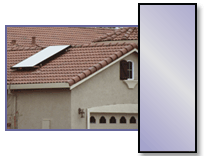 Glazed collector systems are generally made of copper tubing on an aluminum plate with an iron-tempered glass covering, which increases their cost. In colder weather, glazed collector systems—with heat exchangers and transfer fluids—capture solar heat more efficiently than unglazed systems. Therefore, they can be used year-round in many climates. Glazed collectors also can be used to heat domestic hot water year-round. » HelioPak Solar Water & Pool Heater - Glazed Collectors Glazed collector systems are generally made of copper tubing on an aluminum plate with an iron-tempered glass covering, which increases their cost. In colder weather, glazed collector systems—with heat exchangers and transfer fluids—capture solar heat more efficiently than unglazed systems. Therefore, they can be used year-round in many climates. Glazed collectors also can be used to heat domestic hot water year-round. » HelioPak Solar Water & Pool Heater - Glazed Collectors
Both glazed and unglazed collector systems should include freeze protection if they'll be used in colder conditions.
Selecting a Solar Pool Heater
If you'll only be using your pool when temperatures are above freezing, then you'll probably only need unglazed collectors. An unglazed solar pool heating system usually costs between $3,000 and $4,000 to buy and install. This provides a payback of between 1.5 and 7 years, depending on your local fuel costs. They also typically last longer than gas and heat pump pool heaters. Your actual cost and payback depend on many factors. Therefore, before you purchase and install a solar pool heating system, you should do the following:
- Evaluate your site's solar resource
- Determine the correct system size
- Determine the system's efficiency
- Compare system costs
- Investigate local codes, covenants, and regulations
- Contact Solar Direct for additional information/assistance
» VORTEX Sizing Guide: Determine size needed for your specific location
Installation and Maintenance
The proper installation of a solar pool heating system depends on many factors. These factors include solar resource, climate, local building code requirements, and safety issues. Therefore, it's best to have a qualified solar thermal systems contractor install your system.
After installation, properly maintaining your system will keep it running smoothly for 10–20 years. Consult your contractor and read your owner's manual for maintenance requirements. Your collector should require little maintenance if the pool's chemical balance and filtering system are checked regularly. Glazed collectors may need to be cleaned in dry climates where rainwater doesn't provide a natural rinse.
» Inground Solar Pool Heaters
» Aboveground Solar Pool Heaters
Solar Pool Heater Benefits
• Can extend swimming season
• up to 12 months depending on
• location*
• Ave. temp. rise up to 15-20º
• Have no operating costs
• No pollution, no fuel needed
• Usually last 20+ years
• Have a 10 Year warranty
• Quick and easy installation
• Minimal maintenance required |
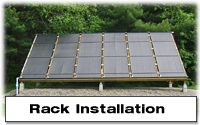 |
*Click here to determine the potential swimming season in your area.
What about....
Many common questions we receiving regarding our
pool heaters include:
How does the weather affect the performance of the Panels?
Our panels are designed to withstand up to
hurricane force winds when the
proper strappings and mounts are used. During rainy weather where the
panels are cooled by the rain, the heat typically generated may be
dimished during the time of active rain. The system can quickly recover
temperatures ones the rain subsides. What about
clouds?
It is important to note
that the
system will continue to function in overcast skies, we explain it using
the analogy of a car in a parking lot. On an overcast day a black car in a
parking lot will still be very hot to the touch, the reason for this is
the UV and thermal energy provided by the sun that cuts through the cloud
barrier continues to heat the system.
A properly sized solar system will effectively raise temperatures well
into the 80°F range. In addition to raising the water temperature,
your swimming season can be extended in cooler climates by as
much as 100 percent, and performs year round in warmer climates.
There may be short periods during inclement weather when the pool
water becomes cooler; however, a little sunny weather will return the
pool back to a comfortable temperature. Solar pool heating systems
are best suited for recreational pools, but can be easily designed for
commercial and industrial applications.
|